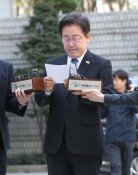Seoul to Play Bridging Role at Nov. G-20 Summit
Seoul to Play Bridging Role at Nov. G-20 Summit
Posted November. 01, 2010 08:11,
The Group of 20 summit in Seoul in November will likely provide host country South Korea the opportunity to play the role of a bridge between advanced and developing economies while upgrading its diplomatic status abroad.
Unlike the G-8 or previous G-20 summits led by the worlds leading economies only, the Seoul summit is expected to allow the country to bridge the gap between advanced and underdeveloped economies.
The process in which the government proposed the establishment of a global financial net, listened to the opinions of developing countries, and reflected on matters involving G-20 agenda dramatically shows how South Korea got out of its past frame of diplomacy focusing on North Korea to transform itself into a leader in forming the world order.
○ Increased influence over emerging economies
The agenda for establishing a global financial safety net as led by Seoul is receiving wide support from emerging economies even before the summit`s opening. The global financial safety net is a device to tackle foreign currency from fleeing emerging economies in a crisis.
Discussion by G-20 leaders of the global financial safety net means more than adoption of the issue as an agenda item.
The proposed establishment of the Asian Monetary Fund has been discussed since 1997 but has gone nowhere because of opposition from advanced economies including the U.S. Advanced economies discussing the financial safety net show that they acknowledge the need to establish one in Asia.
The Seoul-led plan to establish a financial safety net has proven half successful. In late August, the International Monetary Fund eased conditions and ceilings for loans to emerging economies. The second-phase establishment of a financial safety net envisioned by the Korean government involves linking a regional safety net to the International Monetary Fund, a global safety net.
A successful linking of a regional safety net to the global one would make Seouls leadership in setting the agenda and drawing up measures a great diplomatic asset, said Lee Chang-seon, head of financial research at LG Economic Research Institute.
○ Leading role in global development and cooperation
Ahn Ho-young, Seouls ambassador-at-large for the G-20, held a series of talks with countries that are not G-20 members, including Vietnam, Egypt, Ethiopia and Chile, from August to October to listen to their opinions on the Seoul summit.
He said they all welcomed the Seoul summit`s focus on development agenda and urged the establishment of a system ensuring economic growth through aid.
They all recognized that (South) Korea has achieved impressive economic growth in a short period of time, saying the country is leading development agenda, Ahn said.
Other analysts say the Seoul summit has dispelled, to a certain extent, the perception that the G-20 summit is simply a festival among advanced economies.
At the Seoul summit, agreements on some 20 items in nine fields including infrastructure, human resources development, trade, investment, job creation and food security are expected to be reached under the motto of capacity building and growth with resilience.
Yet others say the Seoul summit should respond to developing countries fears that the G-20 development agenda will end up being nothing more than a slogan and the United Nations` claim that the agenda is aimed at replacing its Millennium Development Goals, which focus on fighting abject poverty.
While North Korea`s nuclear program has nothing to do with the official themes of the G-20 summit, a series of bilateral talks between countries in the six-party talks excluding the North will likely narrow differences among them.
lovesong@donga.com zeitung@donga.com







